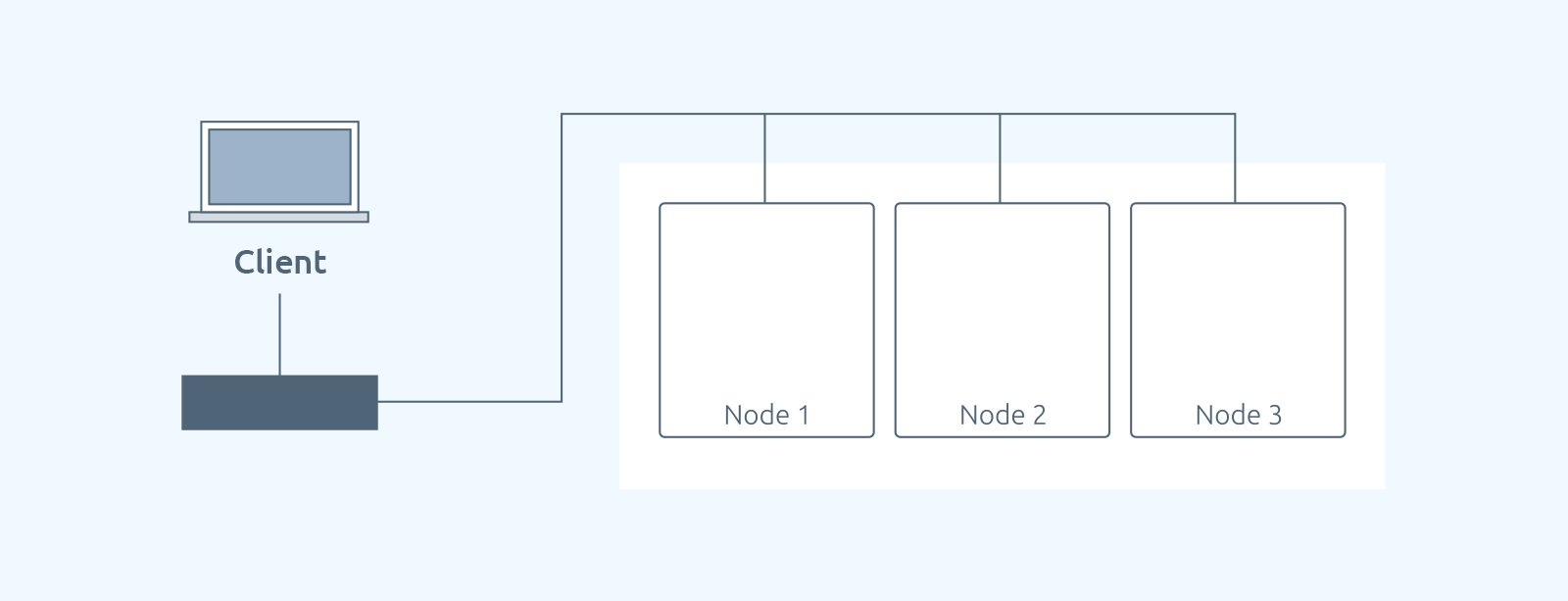Distributed Ceph and SAN network storages in VMmanager
Clusters in VMmanager can be connected to Ceph and SAN storages. Data in them is replicated and stored in a distributed manner. This increases security: in the event of a node failure, the virtual machine disks will not be affected. Ceph and SAN allow you to use high availability Unbreakable clusters in VMmanager.
Buy Free trialCeph distributed storage
Ceph is a software-defined storage based on free software. Ceph has the advantage of high reliability: data is broken down into blocks, replicated and stored on different servers.
 Ceph setup in VMmanager
Ceph setup in VMmanager
 Data replication in Ceph.
Data replication in Ceph.
Redundancy of storage increases reliability. If one of the servers in Ceph fails, the data will be restored on the intact server.
 Data recovery in Ceph. One of the servers failed, but the data that was stored on it was replicated on the other nodes
Data recovery in Ceph. One of the servers failed, but the data that was stored on it was replicated on the other nodes
Ceph allows you to use fast SSDs for cache level - this provides high speed performance of the storage.
SAN network storage in VMmanager
SAN (storage area network) is a high-performance storage network that provides access to block devices in network storage via ISCSI, FC, FCoE or InfiniBand.
 SAN setup in VMmanager
SAN setup in VMmanager
Just like Ceph, SAN is reliable: data in it is backed up and stored on different disk shelves. Other advantages of SAN:
- Saves rack space: disk shelves hold more physical disks than the server.
- Easy to manage: SAN maintenance does not require special knowledge, as it is a hardware solution.
- High-performance dedicated network.
- High hardware reliability.
With distributed Ceph and SAN storage in VMmanager you can create high availability virtualization clusters
Virtual machines in such clusters are automatically recovered in case of disaster.
Try VMmanager with Ceph and SAN support Learn more about high availability clustersSelect the required pricing plan
Hosting
- Automatic provisioning of VPS from 4 seconds
- Multi-tenant architecture
- KVM virtualization
- Lightweight LXC/LXD containers
- Built-in self-service portal
- Integration with billing systems
- Virtual networks
- Flexible service customization and REST API for custom integrations
The cost includes:
- Physical core license € /year
Submit a callback request and we will be sure to answer your questions about products and usage scenarios, give a demonstration, or share helpful materials.
Request a consultationAbout pricing plan
KVM hardware virtualization
LXD containers
Guest OS repositories
Local user management
User management through MS AD/Free IPA/LDAP integration
User self-service portal
Virtualization server management
Support for leased physical equipment
Support for L2 networks—VLAN, bond, bridge
Support for L3 networks—IP-fabric
Support for virtual networks—VXLAN
IP address management
Geographically distributed node clusters
VM distribution policies by node
Software fine-tuning on a VM (Shell/PowerShell)
Network storages (Ceph/SAN)
Local storages
REST API available
Live migration of VMs between nodes
Live migration of VM disks between storages
Built-in VM backup system
Built-in node and VM monitoring system
High availability
Integration with BILLmanager
Integration with DCImanager
Integration with IPmanager
Integration with DNSmanager
Integration with Terraform
Integration with Swagger
Integration with Zabbix
Integration with Grafana
Integration with Telegram
Integration with WHMCS
Integration with PowerDNS
AlmaLinux
Ubuntu